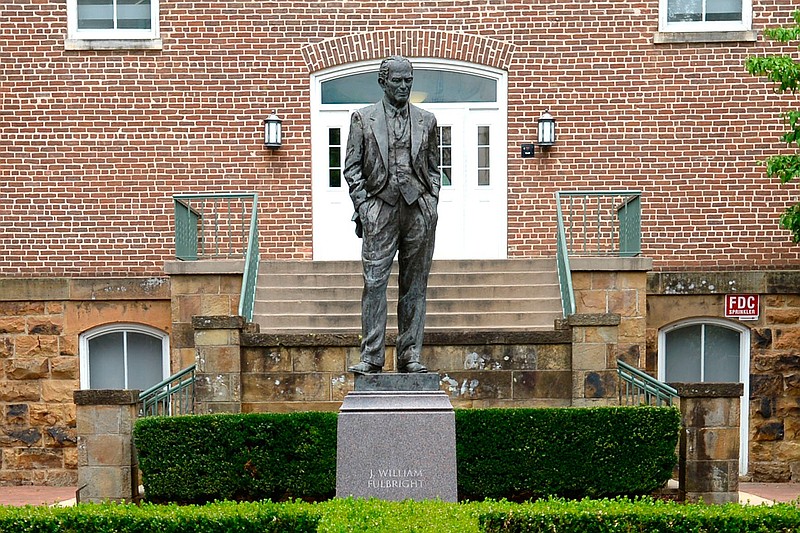FAYETTEVILLE, Ark. - A University of Arkansas committee says tributes honoring a former senator, alum and segregationist whose beliefs did not align with the values of the institution today should be removed from campus.
The committee considered J. William Fulbright's stance on integration and civil rights in the 1950s and 1960s before recommending his statue be removed and his name stripped from the university's arts and sciences college, the Arkansas Democrat-Gazette reported.
Fulbright was a UA graduate and served as the university's president for three years starting in 1939. He is known worldwide for creating an international education scholarship in his name.
"There was a time when Black students were not welcome on our campus," the committee said following its review of Fulbright's legacy. "J. William Fulbright, while senator, voted against the interests of Black students, and supported values antithetical to the university. For many, the statue is a memorial to those segregationist values and a daily reminder to our Black students of that time."
The committee - comprising students, alumni, faculty and staff - also recommended the name of former Arkansas Gov. Charles Brough be removed from a campus dining hall due to his role in the 1919 Elaine Massacre, one of the largest racial mass killings in U.S. history.
"The committee recognizes that these recommendations alone will not transform the University of Arkansas into a wholly equitable and antiracist campus. Nonetheless, public memorials, statues and dedications need to be changed if they reinforce historic racism," the committee stated.
In a statement posted Wednesday on the university's website, Chancellor Joe Steinmetz said the university would gather feedback and consider input and perspectives from other university stakeholders, including faculty, staff, alumni and students.
The feedback would conclude in late May and any changes would need to be approved by the university system's board of trustees, the statement said.
"This matter is complicated by Sen. Fulbright's deep connections to the state and university, and important international contributions, at the same time acknowledging that the name causes pain for some on our campus, which is unfortunate," Steinmetz said.
Sen. Mark Johnson warned that a bill that has yet to be signed into law would restrict the removal of public monuments.
"The bill was not specifically aimed at that or any other statue," Johnson said. "It protects the Sen. Fulbright statue, it protects Confederate monuments, it protects the Little Rock Nine memorial on the Capitol grounds."
The bill would allow for petitions to the Arkansas Historical Commission seeking approval to remove monuments.
UA spokesman Mark Rushing said in an email that the "university will follow the law concerning any recommendations or decisions on these matters."
Daniel Webster, president of the UA Black Students Association and a member of the committee, said whether the recommendations are followed or what the next steps are, "we'll at least know how the committee felt for years to come, and I think that was really important."

